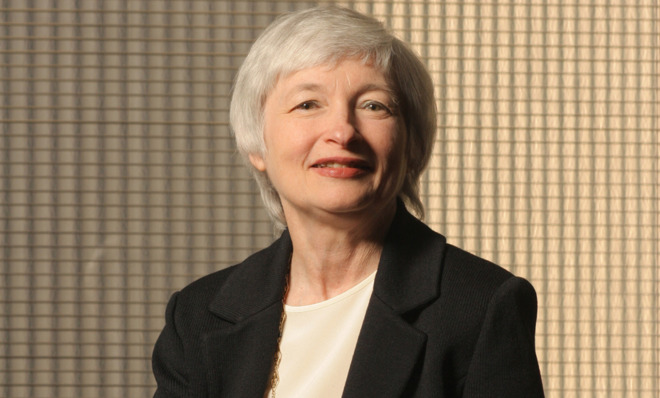Janet Yellen: 6 things to know about the presumptive Fed chair
Meet the next Ben Bernanke

A free daily email with the biggest news stories of the day – and the best features from TheWeek.com
You are now subscribed
Your newsletter sign-up was successful
No more nervous speculation.
On Wednesday at 3p.m., President Obama is slated to officially nominate Janet Yellen to replace Ben Bernanke as chair of the Federal Reserve when his term runs out at the end of January.
The decision will follow months of debate over who should take the reins at the central bank: Yellen or former Treasury Secretary Larry Summers. In mid-September, amid criticism from both parties, Summers backed out of the race, saying, "Any possible confirmation process for me would be acrimonious and would not serve the interest of the Federal Reserve."
The Week
Escape your echo chamber. Get the facts behind the news, plus analysis from multiple perspectives.

Sign up for The Week's Free Newsletters
From our morning news briefing to a weekly Good News Newsletter, get the best of The Week delivered directly to your inbox.
From our morning news briefing to a weekly Good News Newsletter, get the best of The Week delivered directly to your inbox.
This, of course, left Yellen. Assuming the Senate confirms her, she will take the helm of the central bank at a delicate moment in our economic history — as the fragile recovery tries to gain traction, and the bank continues to weigh when to start reining in its easy money policies.
Here, everything you need to know about Janet Yellen.
1. She has an incredible resume
Yellen is now the vice chairwoman of the Federal Reserve — Ben Bernanke's second-in-command. But she's been in the upper echelons of monetary policy for two decades now.
A free daily email with the biggest news stories of the day – and the best features from TheWeek.com
Top-ranking policy positions have included: Chairman of the Council of Economic Advisors, Fed governor, and San Francisco Fed president. "It's a level of experience that's unprecedented in the history of the system," says Matthew Yglesias at Slate.
In addition, these positions followed an equally long career in academia. After getting her PhD at Yale, Yellen scored her first job as an assistant professor at Harvard in 1971, where Larry Summers, her future rival for Fed chair, was a student. Later, she taught at the London School of Economics before becoming a professor at Berkeley's Haas School of Business.
2. She's an economic "dove"...
In economics, being a "dove" means tending to prioritize lowering unemployment over taming inflation.
Yellen "focused much of her academic research on the costs and causes of unemployment," says The Wall Street Journal, and that background is apparent in her policy. She has "consistently called for the Fed to respond forcefully to high joblessness," and held that "inflation isn't likely to emerge with the economy in such a debilitated state."
3. ...but not at the expense of encouraging too much inflation
That said, she has a strong record of shaping policy around inflation, as well. Calling her "committed to maintaining low inflation," The Journal also notes that she has been at the vanguard of recognizing the dangers of going too low:
She was a longstanding proponent of the Fed adopting a two percent inflation target, and was closely involved in the decision to do so in 2012. In 1996, while a Fed governor, Ms. Yellen debated then-Chairman Alan Greenspan over the right level of inflation, contending that too-low inflation could harm the economy just as too-high inflation could — a view that is now widely accepted at the Fed, but wasn’t then. [The Wall Street Journal]
4. She thinks we need tighter banking regulations
As Yglesias points out, Yellen "doesn't have many well-known views on the subject" of financial regulations. But since the financial crisis, she has at least given lip service to the idea that the banking industry could use a tighter leash.
“This experience has strongly inclined me toward tougher standards and built-in rules that will kick into effect automatically when things like this happen,” she told the Financial Crisis Inquiry Commission in a speech in 2010, notes the Journal.
5. She's great at making predictions
On top of her unparalleled experience, Yellen has a few extra feathers in her cap. For one, she was "one of the few Federal Reserve governors who warned about the Great Recession," says USA Today. Just a few months before Lehman Brothers collapsed in 2008, she told fellow Fed leaders: "The possibilities of a credit crunch developing and of the economy slipping into a recession seem all too real."
In fact, her entire predictive record is pretty impressive — "the envy of the Fed," says The Washington Post. A Wall Street Journal analysis says she has a better record at predicting the economy than any other Fed policymaker in years — by a wide margin.
6. She's busting a pretty major glass ceiling
Assuming the Senate confirms her, she will hold the highest economic job ever appointed to a woman in the U.S. No woman has ever led the Treasury Department or the National Economic Council, much less the Federal Reserve. The Week's Peter Weber notes this will make Yellen arguably "the most powerful woman in U.S. history."
Carmel Lobello is the business editor at TheWeek.com. Previously, she was an editor at DeathandTaxesMag.com.
-
 ‘This is something that happens all too often’
‘This is something that happens all too often’Instant Opinion Opinion, comment and editorials of the day
-
 House votes to end Trump’s Canada tariffs
House votes to end Trump’s Canada tariffsSpeed Read Six Republicans joined with Democrats to repeal the president’s tariffs
-
 Bondi, Democrats clash over Epstein in hearing
Bondi, Democrats clash over Epstein in hearingSpeed Read Attorney General Pam Bondi ignored survivors of convicted sex offender Jeffrey Epstein and demanded that Democrats apologize to Trump